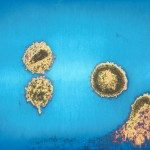Link to Pubmed [PMID] – 21217078
Link to DOI – 10.1182/blood-2010-05-287193
Blood 2011 Mar; 117(10): 2944-52
Macrophages infected with HIV-1 sustain viral replication for long periods of time, functioning as viral reservoirs. Therefore, recognition of factors that maintain macrophage survival and influence HIV-1 replication is critical to understanding the mechanisms that regulate the HIV-1-replicative cycle. Because HIV-1-infected macrophages release the nerve growth factor (NGF), and NGF neutralization reduces viral production, we further analyzed how this molecule affects HIV-1 replication. In the present study, we show that NGF stimulates HIV-1 replication in primary macrophages by signaling through its high-affinity receptor Tropomyosin-related Kinase A (TrKA), and with the involvement of reticular calcium, protein kinase C, extracellular signal-regulated kinase, p38 kinase, and nuclear factor-κB. NGF-induced enhancement of HIV-1 replication occurred during the late events of the HIV-1-replicative cycle, with a concomitant increase in viral transcription and production. In addition, NGF reduced the synthesis of the cellular HIV-1 restriction factor APOBEC3G and also overrode its interferon-γ-induced up-regulation, allowing the production of a well-fitted virus. Because NGF-TrKA signaling is a crucial event for macrophage survival, it is possible that NGF-induced HIV-1 replication plays a role in the maintenance of HIV-1 reservoirs. Our study may contribute to the understanding of the immunopathogenesis of HIV-1 infection and provide insights about approaches aimed at limiting viral replication in HIV-1 reservoirs.


